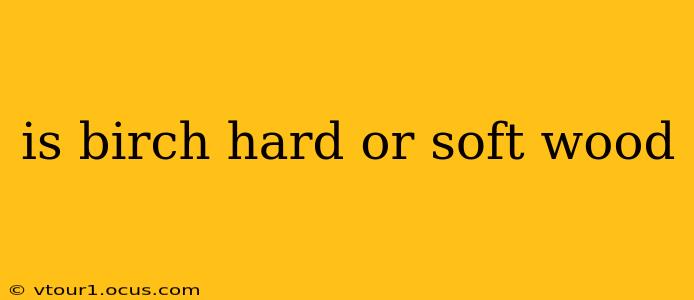Birch is often categorized as a hardwood, but its hardness varies depending on the specific species. While generally harder than many softwoods like pine or fir, it's not as hard as some other hardwoods like oak or maple. This nuanced understanding is crucial for selecting the right type of birch for specific applications. Let's delve deeper into the properties of birch wood to clear up any confusion.
What Makes a Wood "Hard" or "Soft"?
Before we classify birch, let's define what distinguishes hardwoods from softwoods. The terms "hardwood" and "softwood" aren't solely based on the wood's actual hardness. Instead, the classification hinges on the type of tree:
-
Hardwoods: Come from deciduous (broadleaf) trees that lose their leaves annually. They generally have a more complex cellular structure, resulting in denser and harder wood (though there are exceptions).
-
Softwoods: Come from coniferous (needle-leaf) trees that retain their needles year-round. These usually have a simpler cellular structure, leading to softer wood (again, exceptions exist).
Is Birch a Hardwood or Softwood?
Birch trees are deciduous, belonging to the Betula genus. Therefore, birch is classified as a hardwood. However, its Janka hardness score (a measure of wood's resistance to denting) places it somewhere in the middle range of hardwoods. This means it's harder than many softwoods but softer than some other hardwoods.
How Hard is Birch Compared to Other Woods?
The Janka hardness scale provides a numerical value for a wood's hardness. While the exact Janka score varies slightly depending on the birch species and growing conditions, it generally falls between 1260 and 1470 lbf (pounds-force). For comparison:
- Softwoods: Pine (around 400 lbf), Fir (around 400-600 lbf)
- Hardwoods: Oak (around 1360-1500 lbf), Maple (around 1450 lbf), Ash (around 1300 lbf)
As you can see, birch sits comfortably within the hardwood range but isn't the hardest hardwood available.
What are the Different Types of Birch Wood?
Several birch species exist, each with slightly different properties:
- Yellow Birch: Known for its strength and durability.
- Paper Birch: Lighter in color and less dense than yellow birch.
- Sweet Birch: A harder variety compared to other birches.
The specific properties, including hardness, will vary depending on the birch species in question.
What is Birch Wood Typically Used For?
Birch's hardness and other properties make it suitable for various applications:
- Furniture: Its appealing grain and workability make it popular in furniture making.
- Flooring: It offers a durable and attractive flooring option.
- Plywood and Veneer: Widely used in construction and cabinetry due to its strength and smooth surface.
- Turning: Its machinability makes it a good choice for woodturning projects.
What are the Advantages and Disadvantages of Birch Wood?
Advantages:
- Attractive appearance: It possesses a beautiful grain and takes stains well.
- Relatively strong and durable: Suitable for various applications.
- Good workability: Easy to machine, cut, and shape.
- Cost-effective: Generally more affordable than some other hardwoods.
Disadvantages:
- Susceptibility to damage: Although relatively hard, it's not as resistant to dents and scratches as some other hardwoods.
- Can be prone to checking (cracking): Requires proper drying and care.
By understanding birch's properties and its place within the hardwood spectrum, you can make informed decisions about using it in your projects. Remember to consider the specific species of birch when selecting the wood for its intended purpose.
